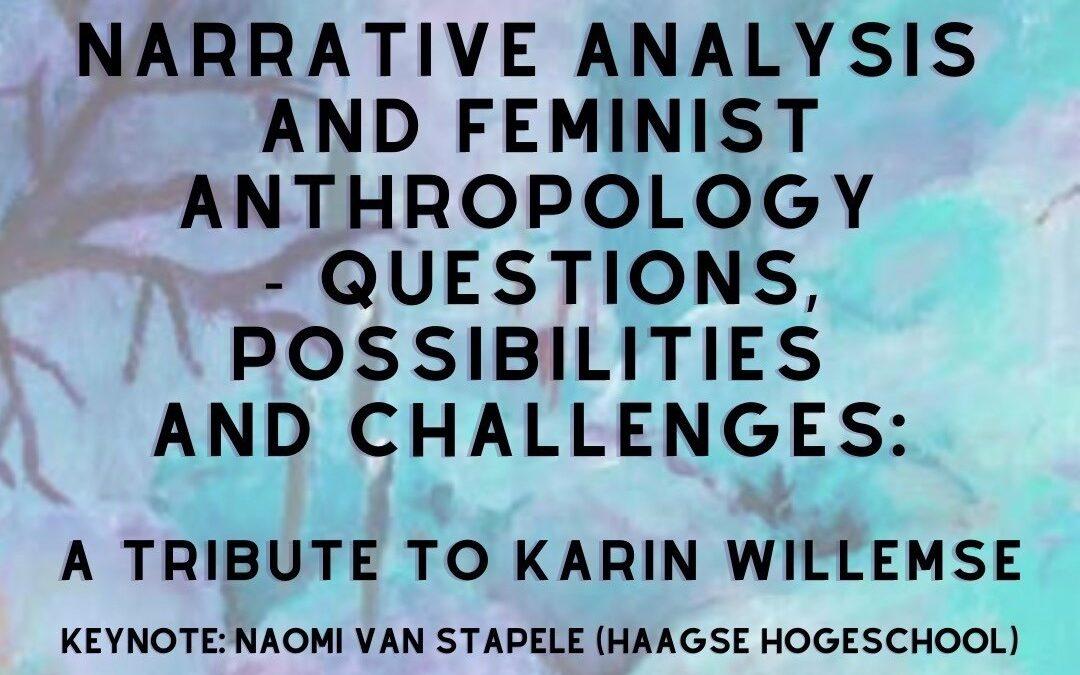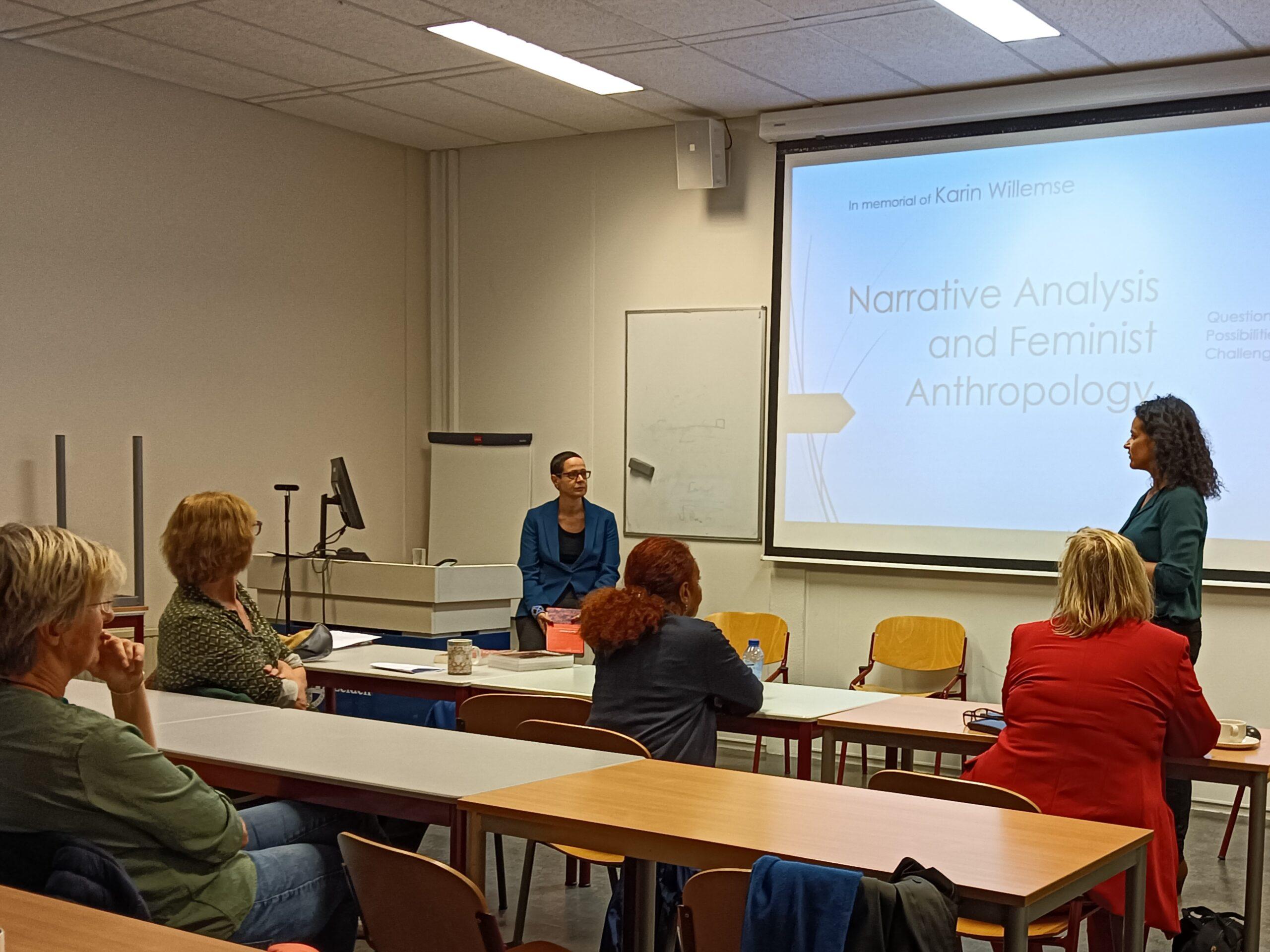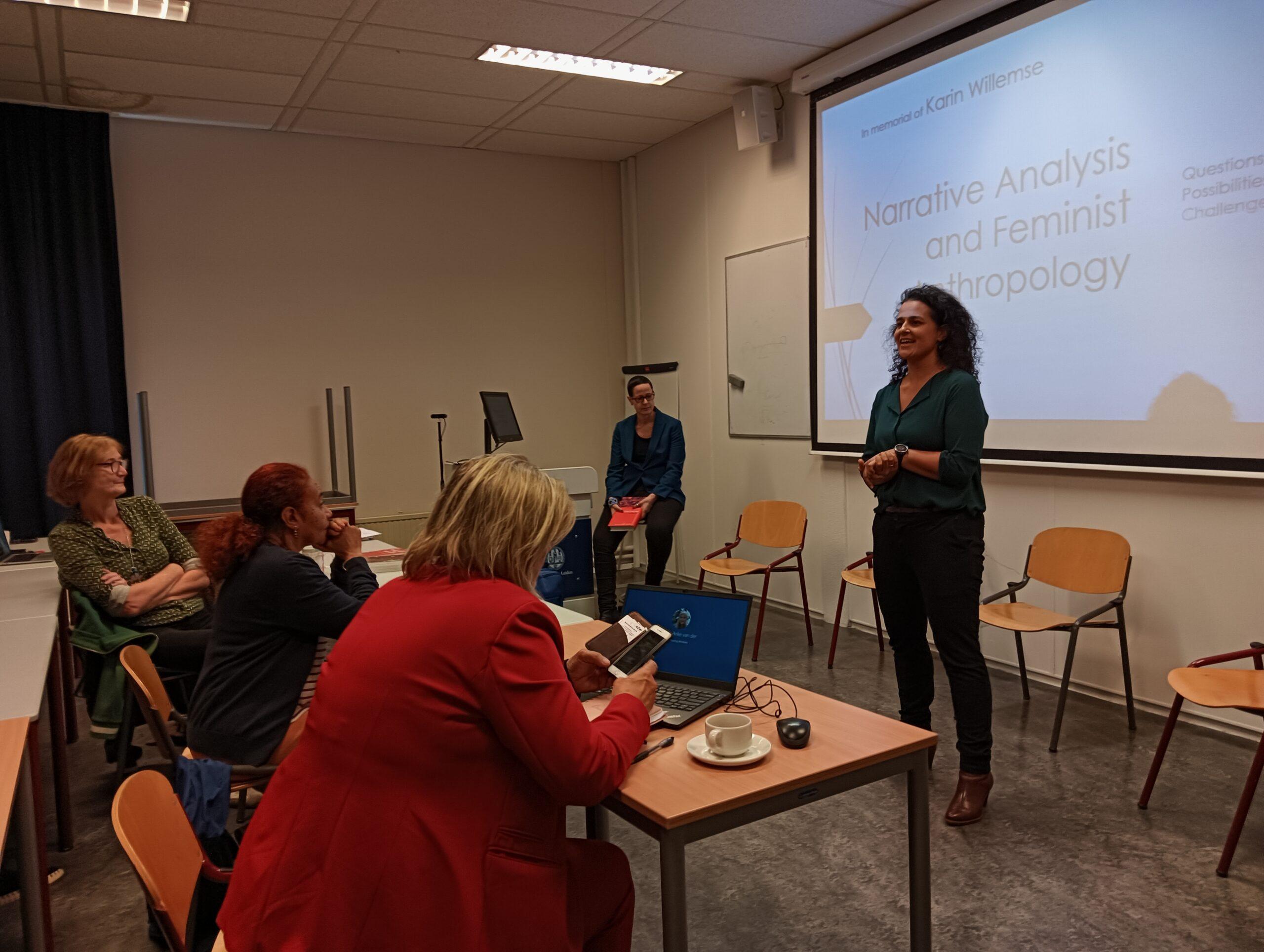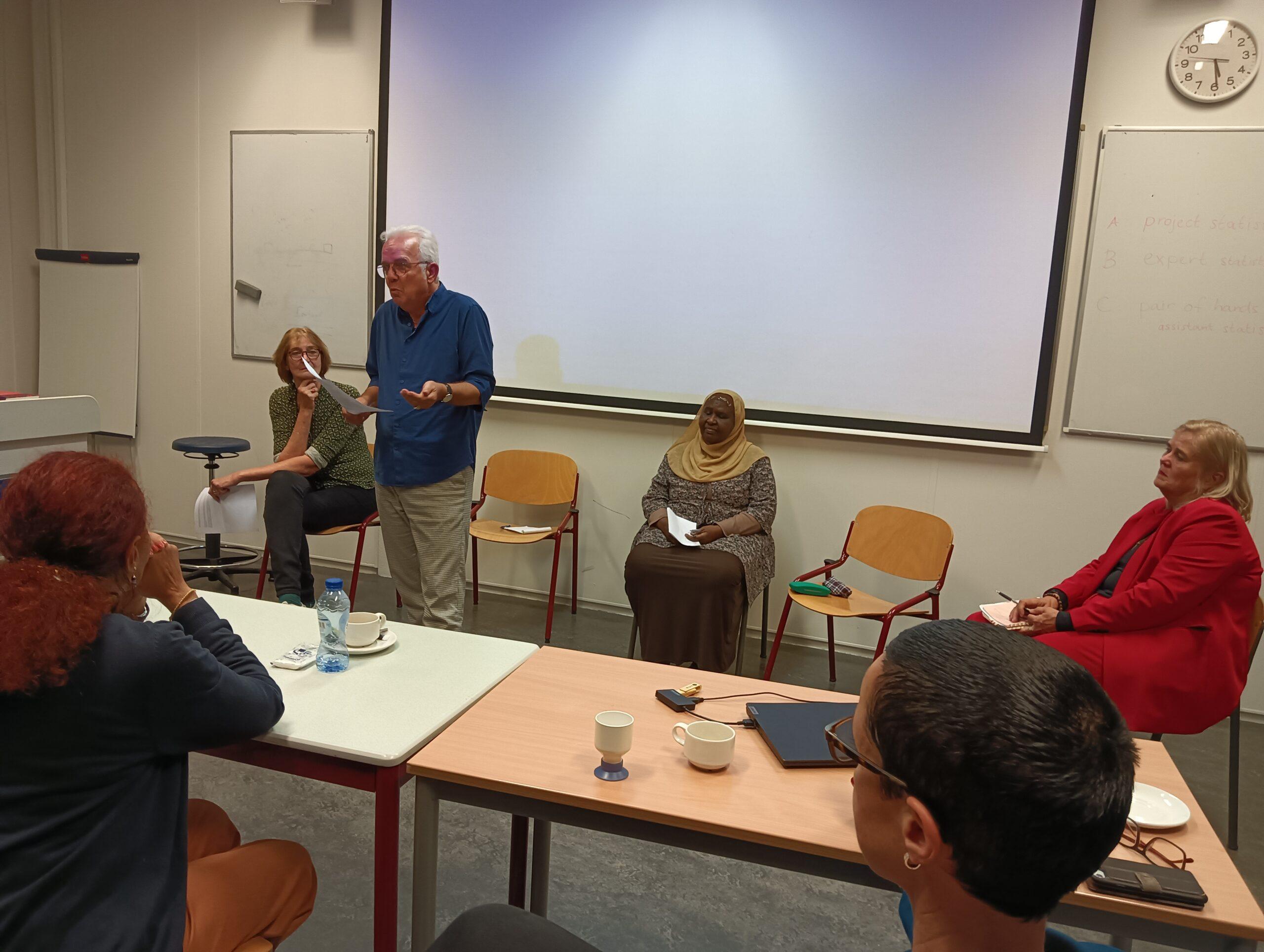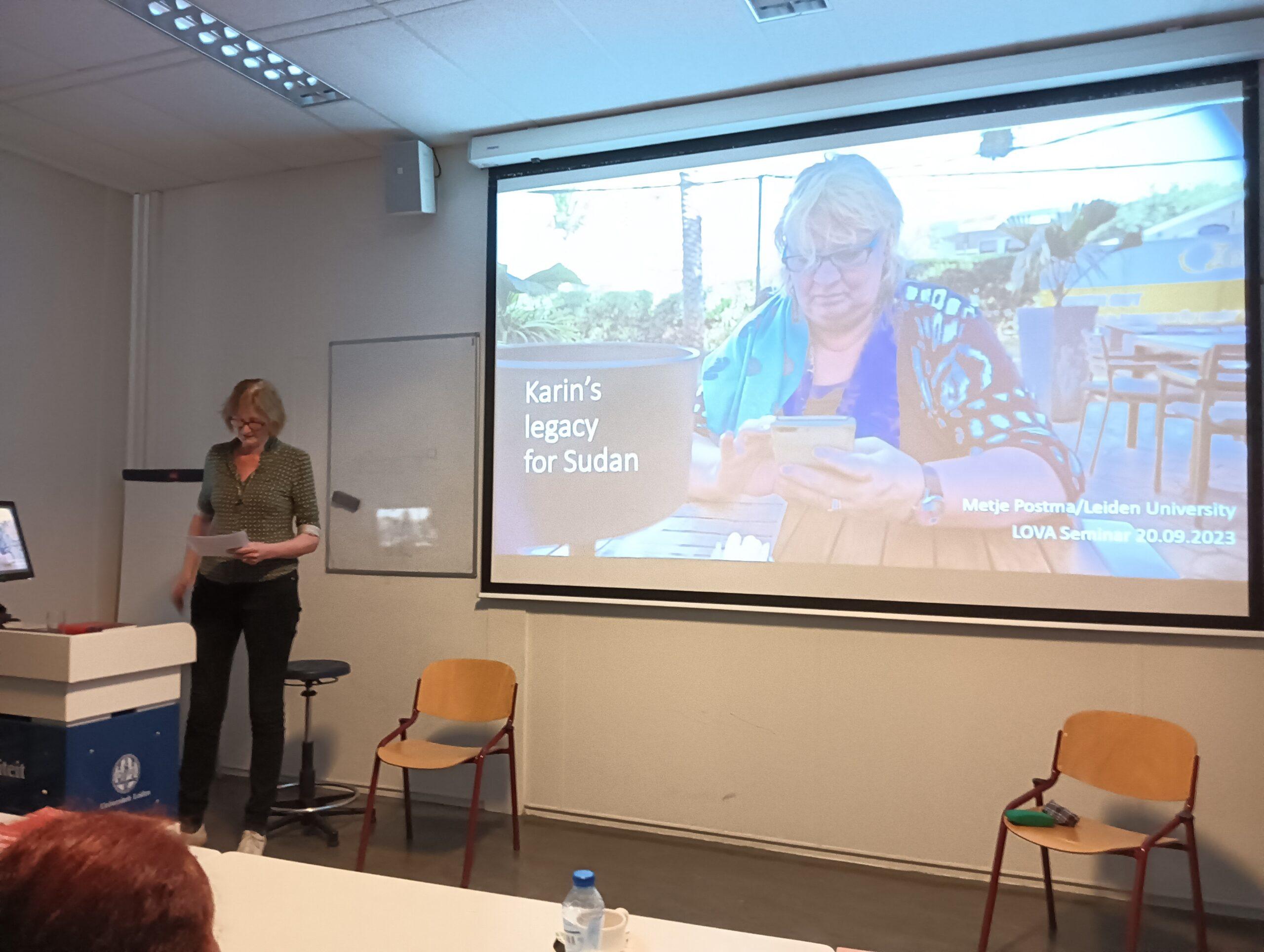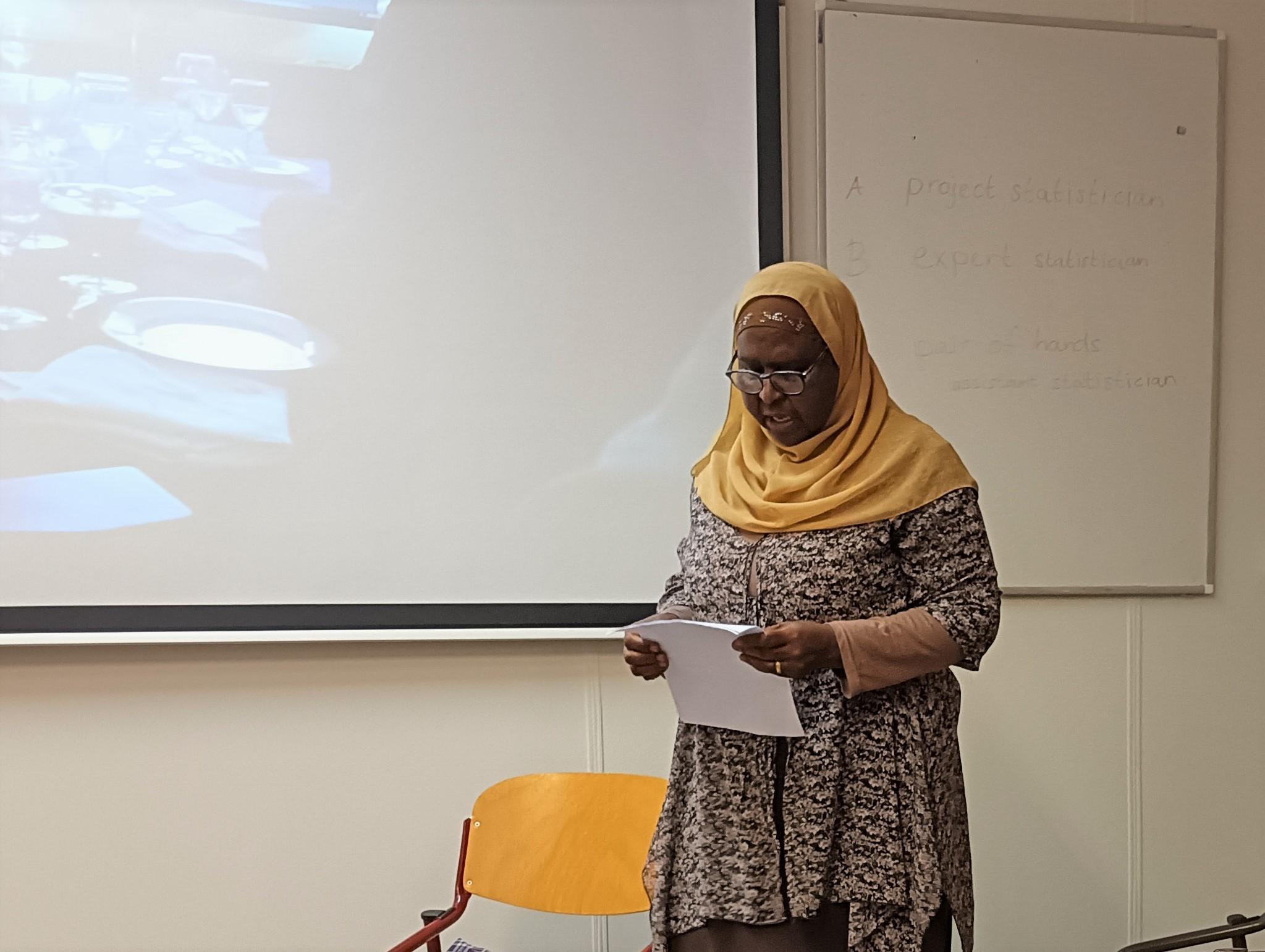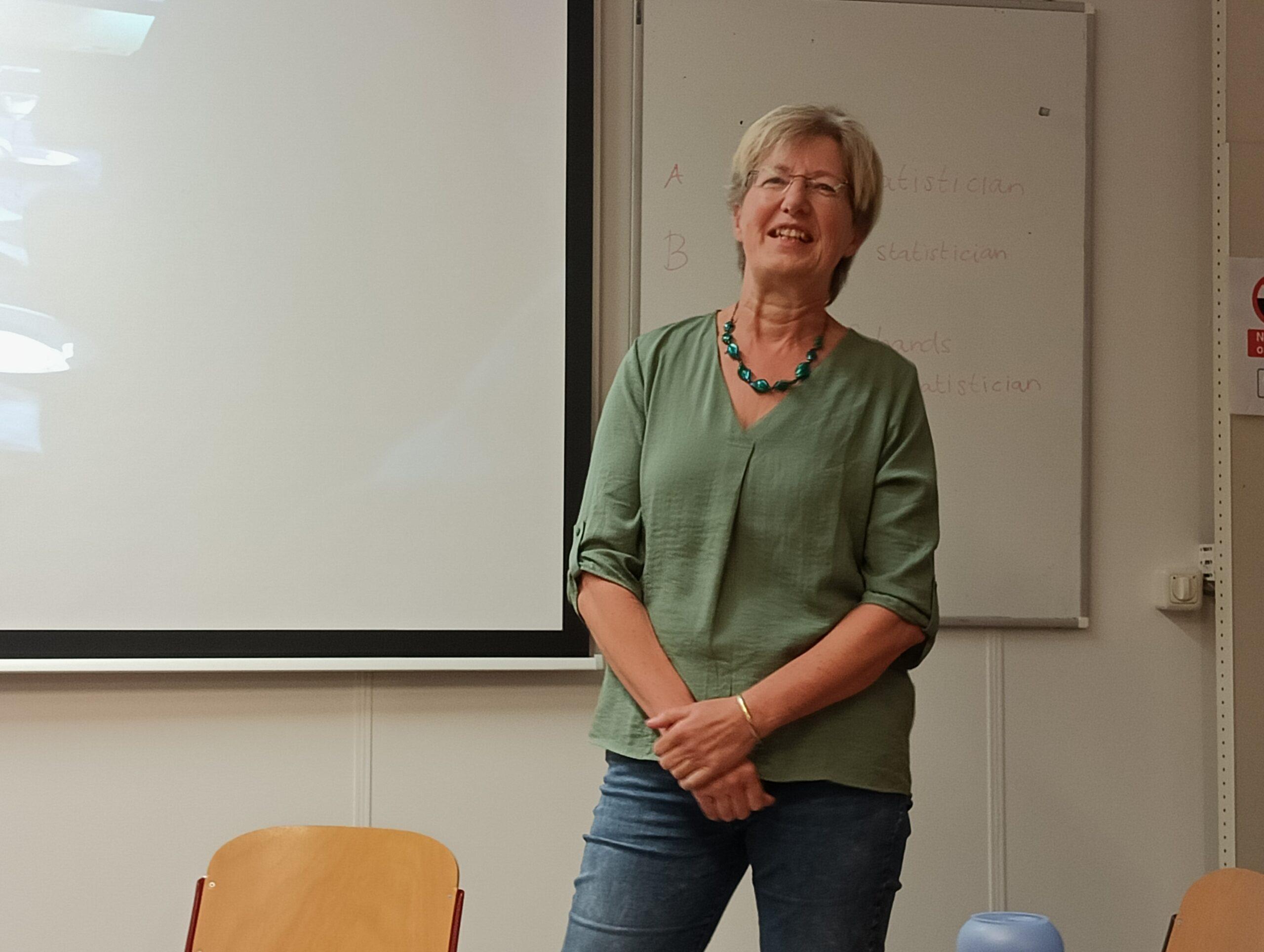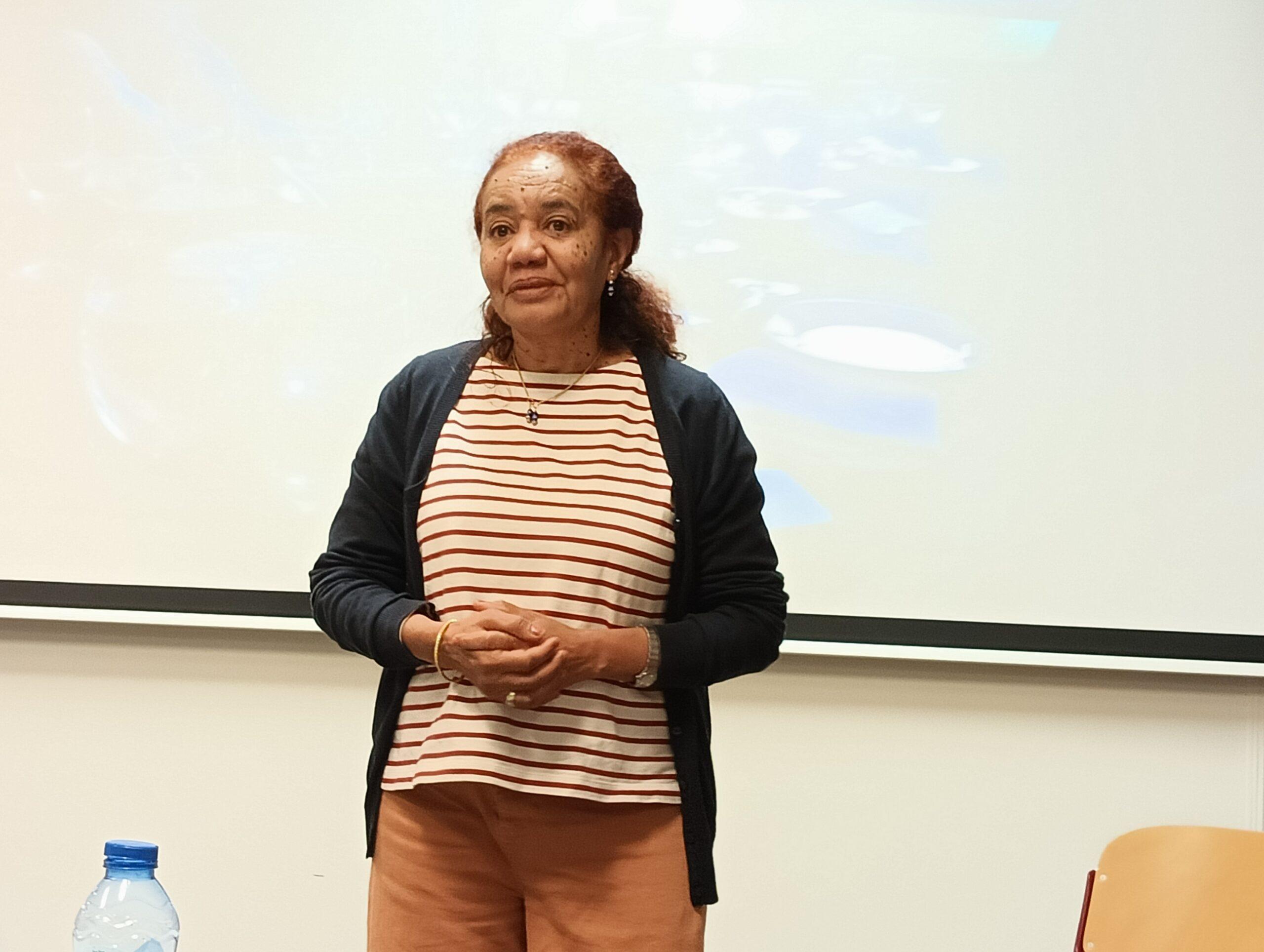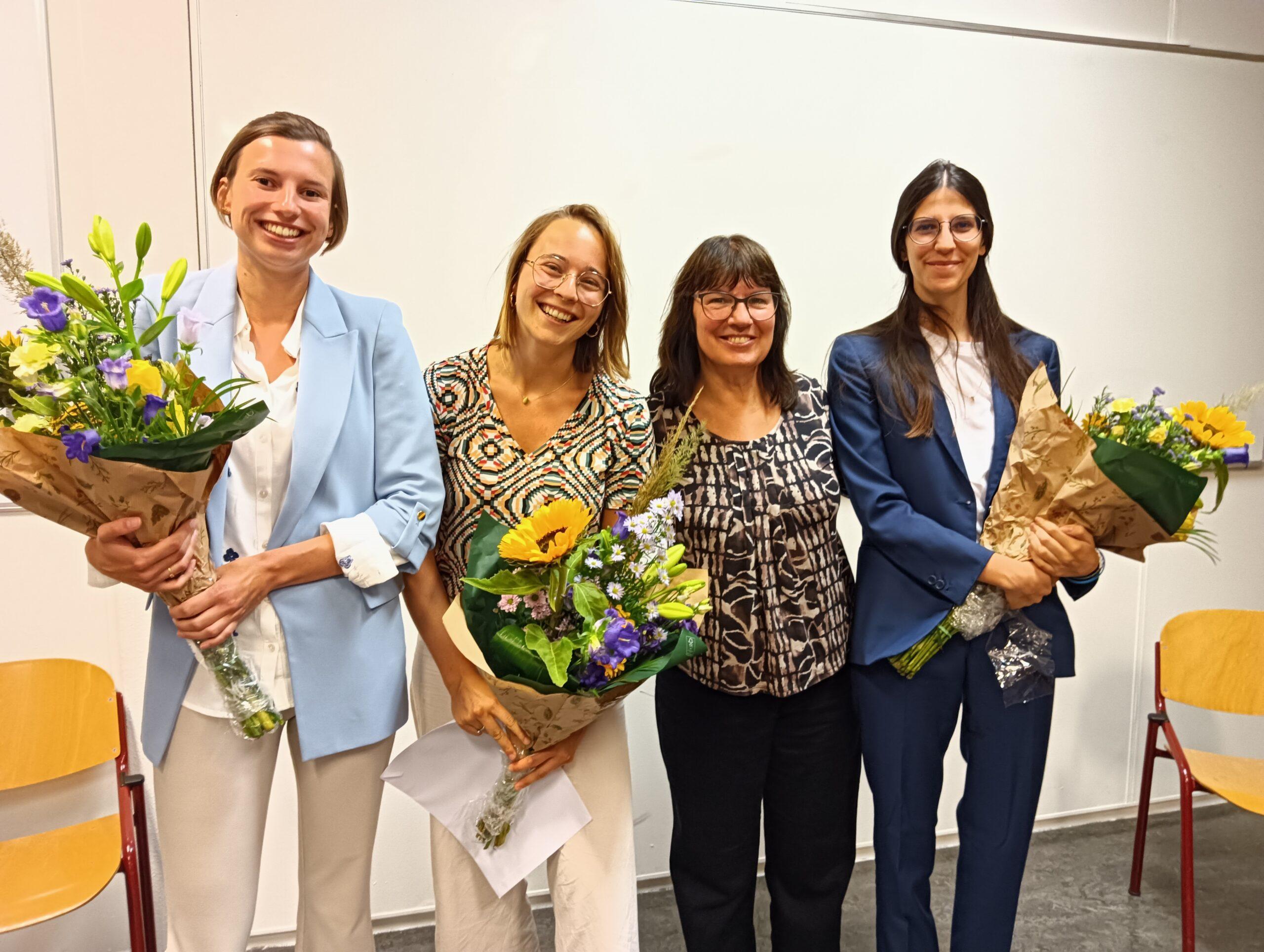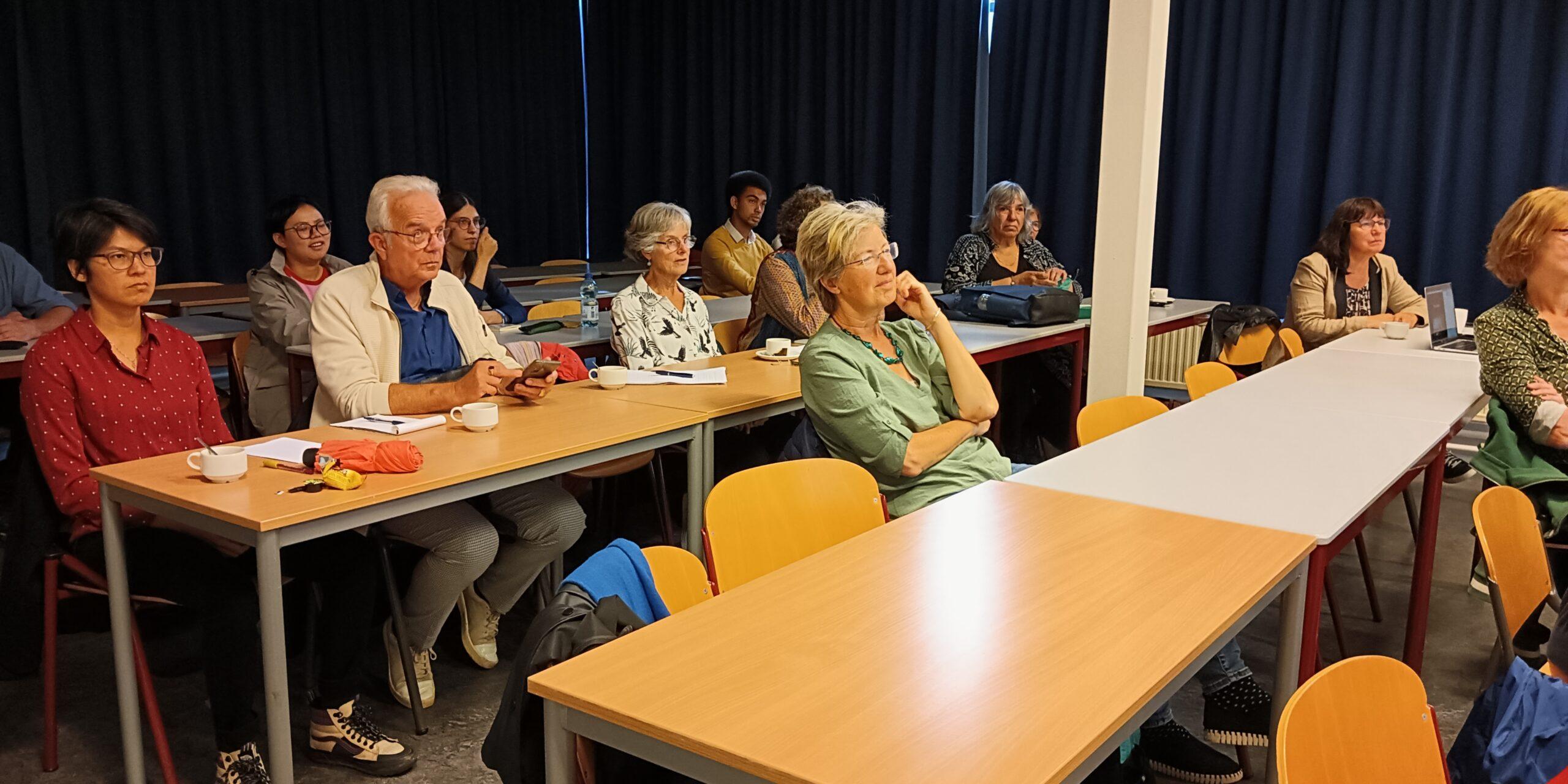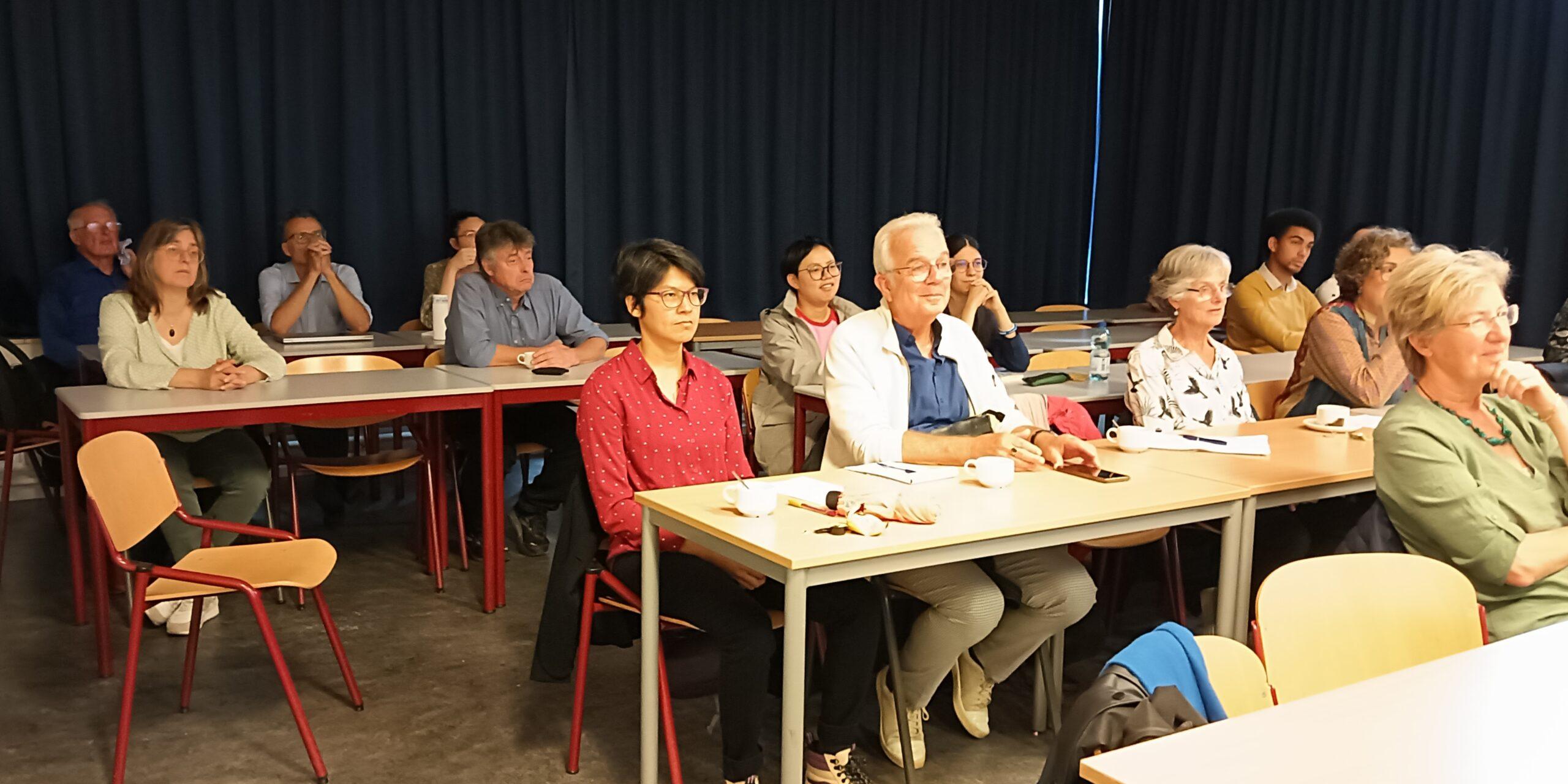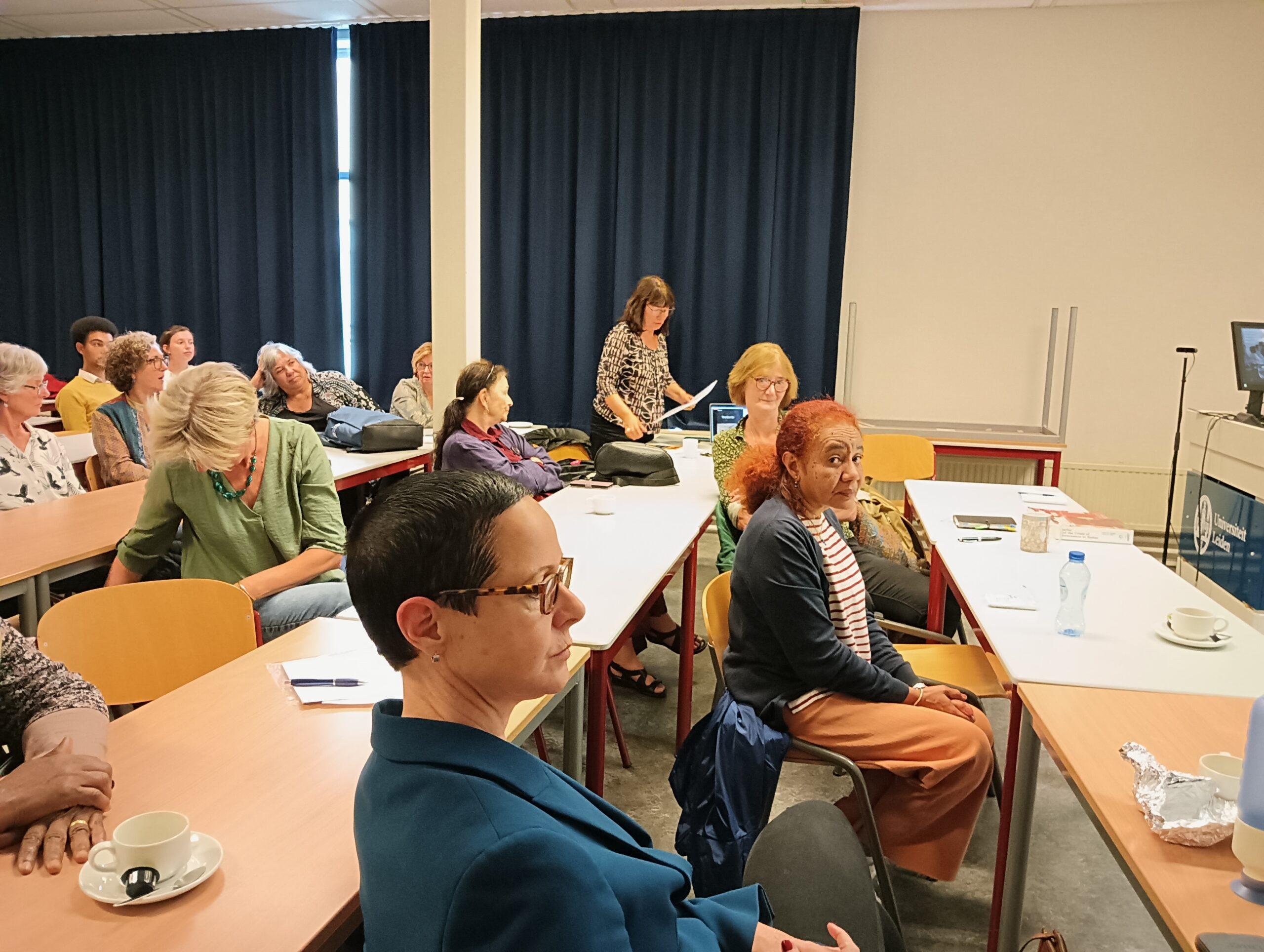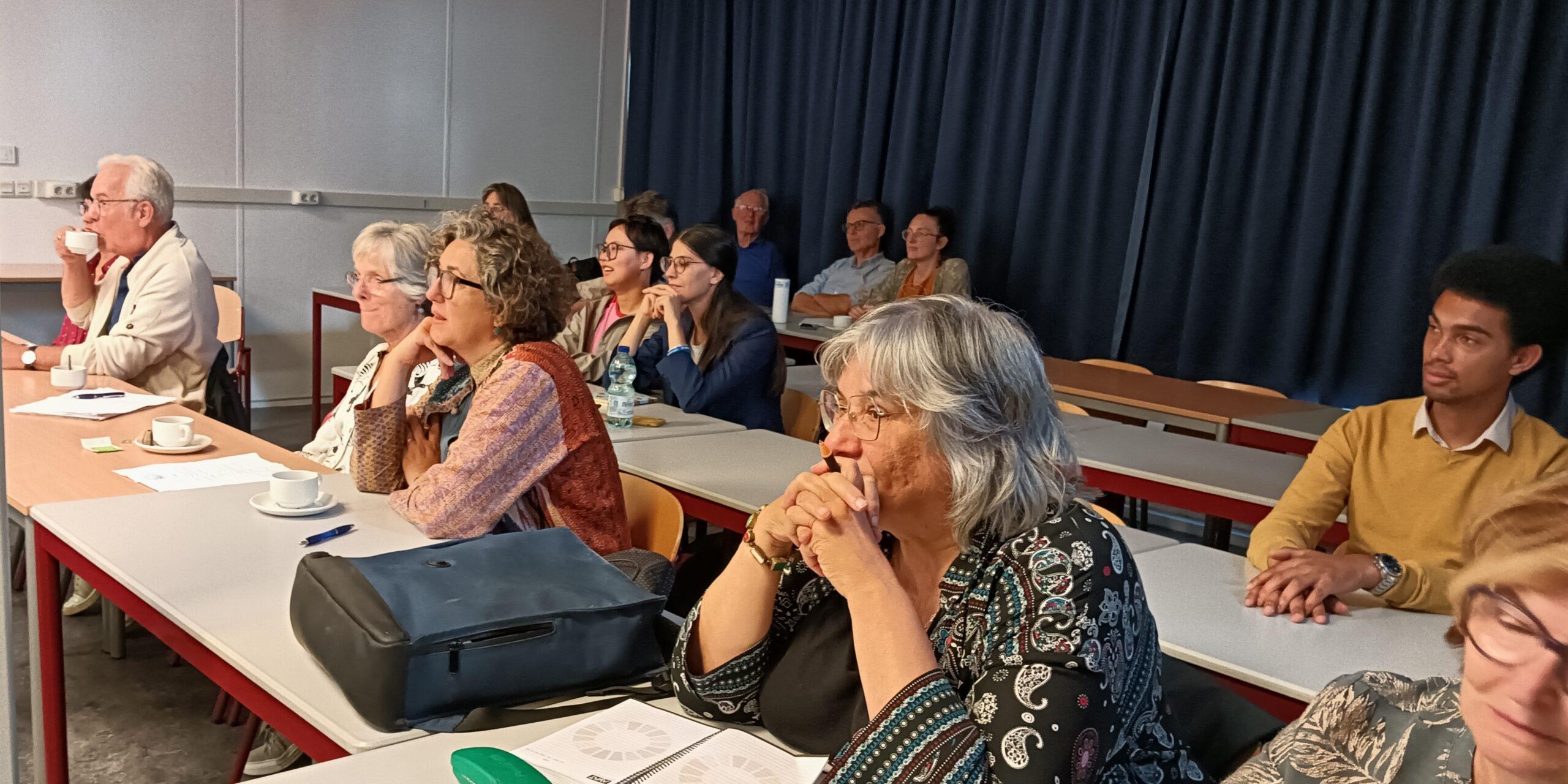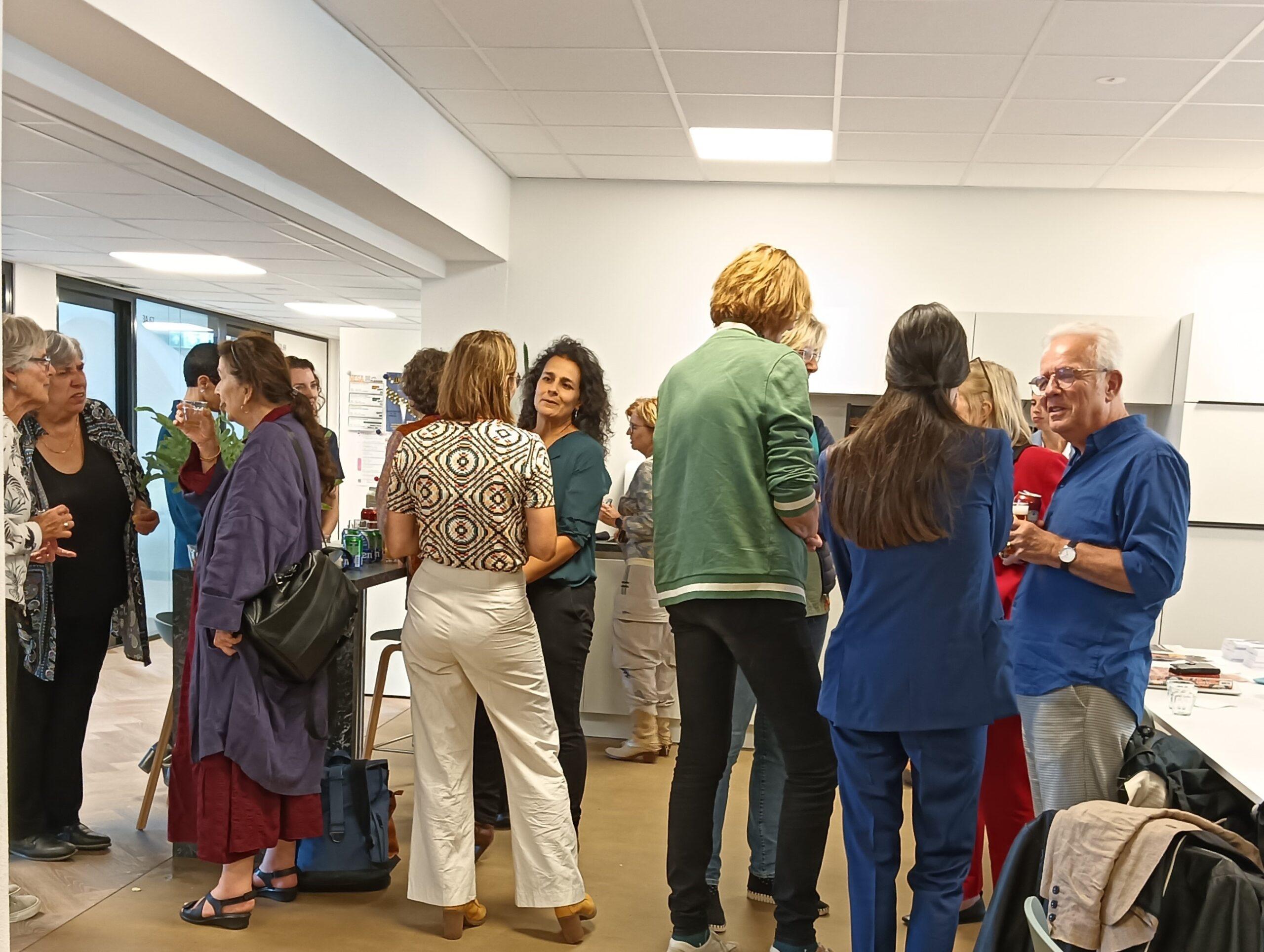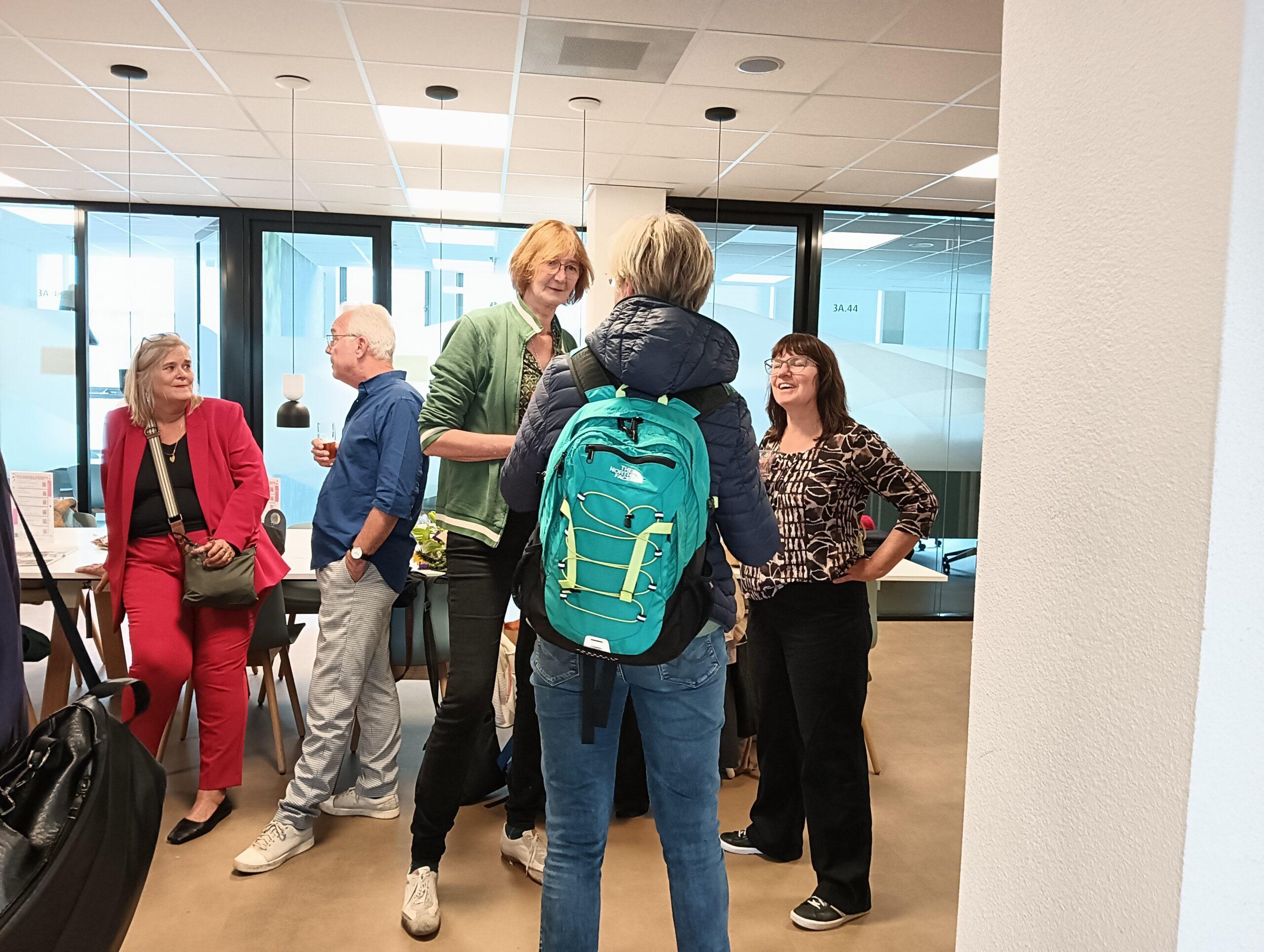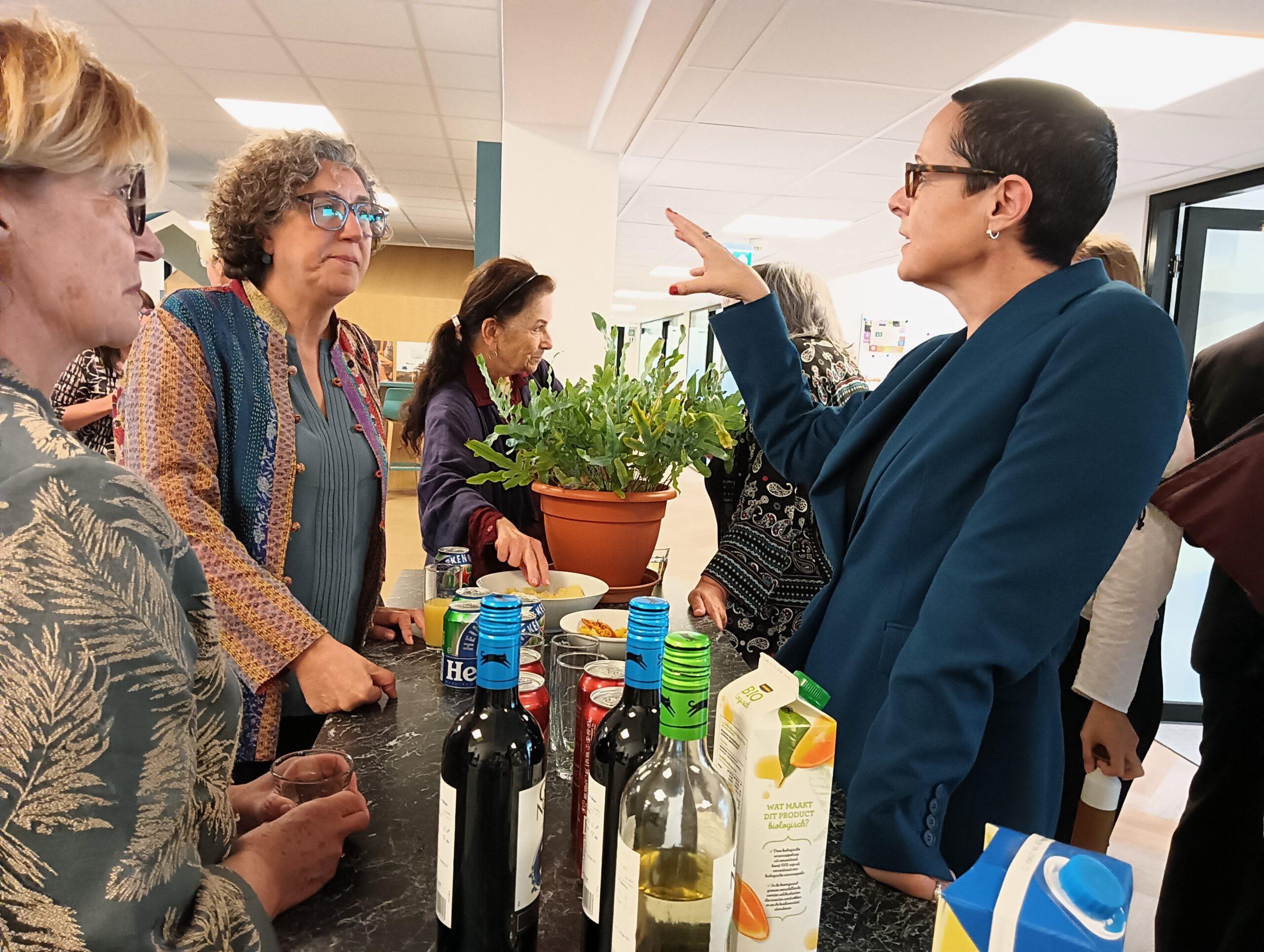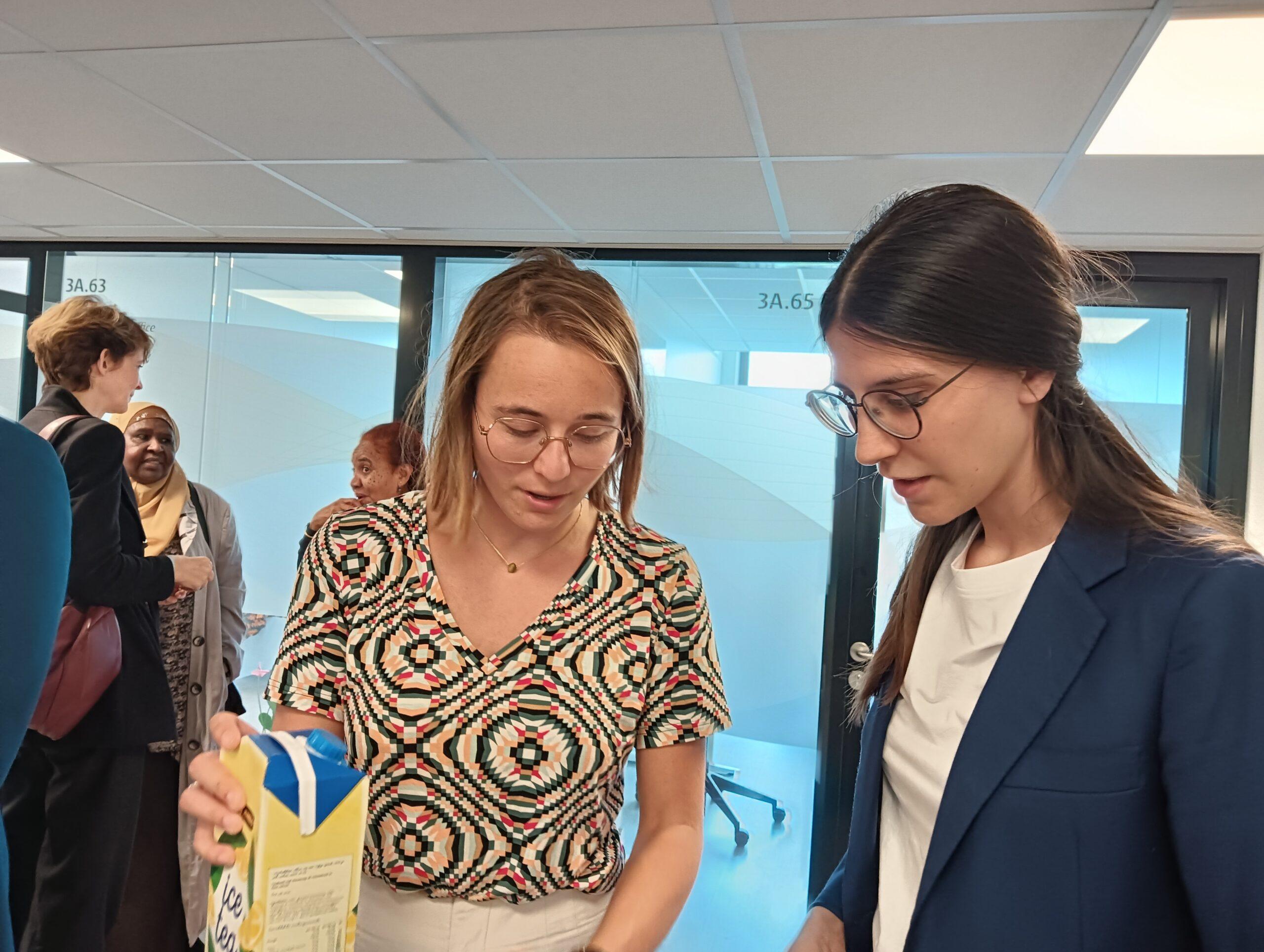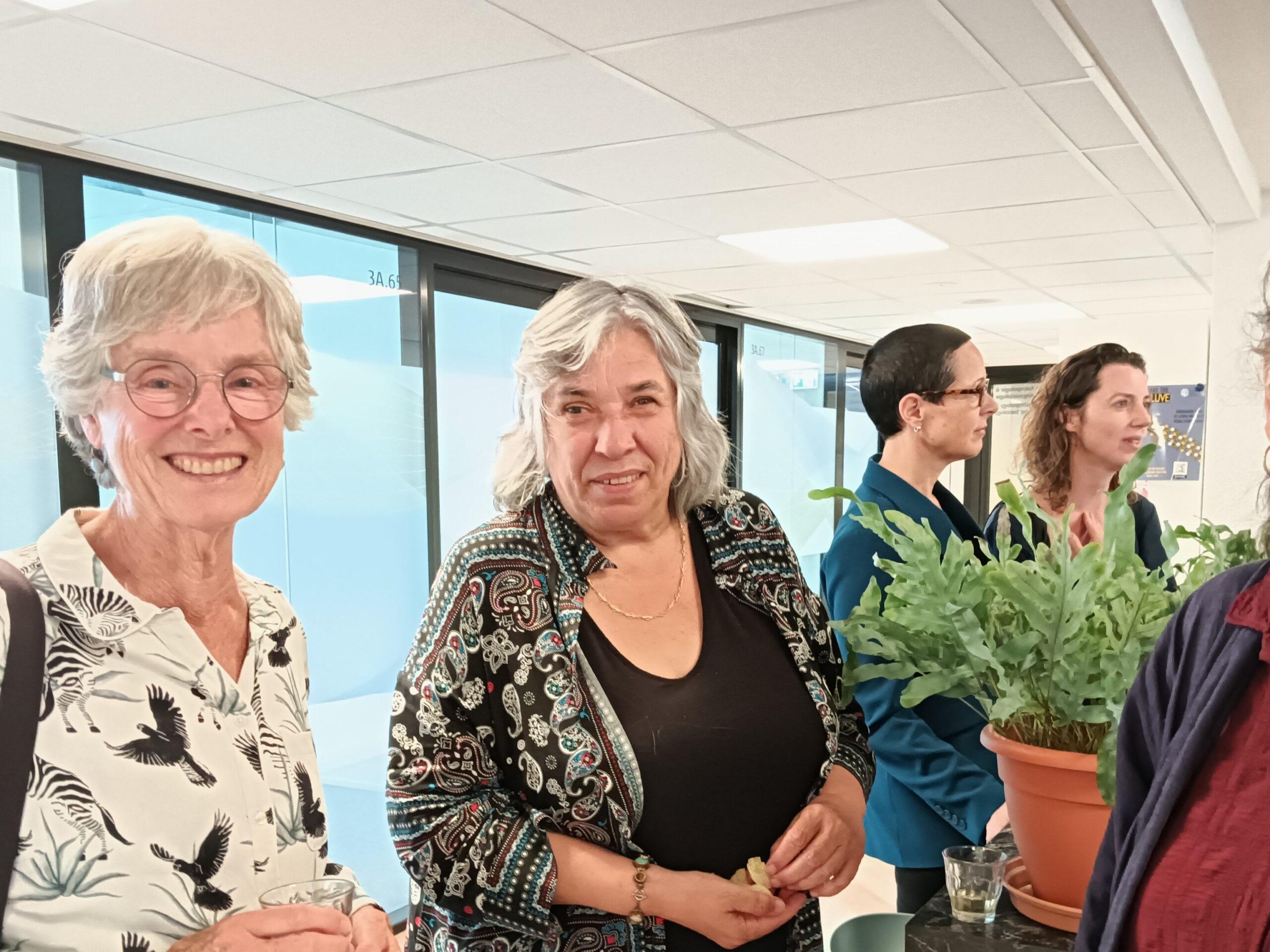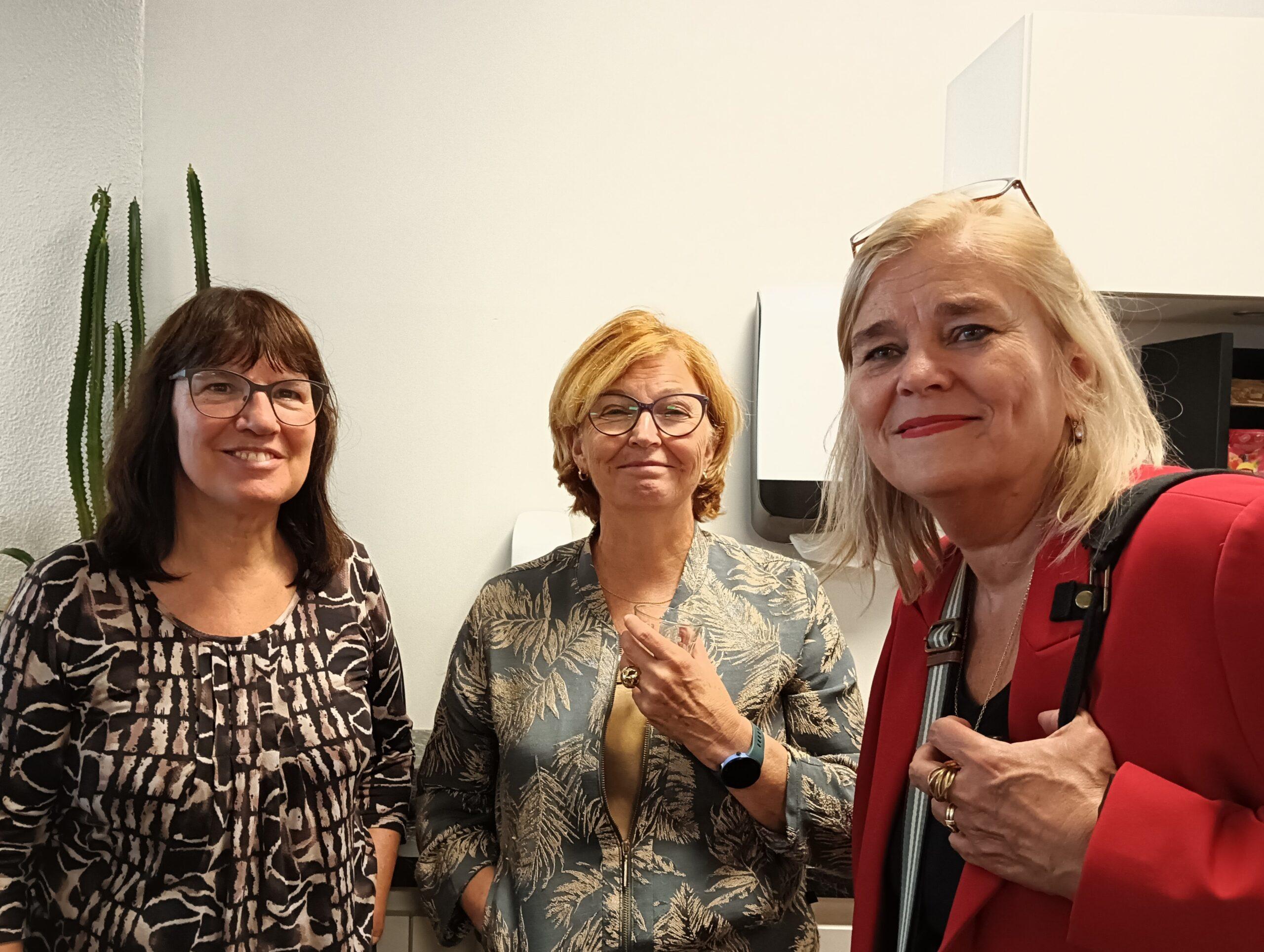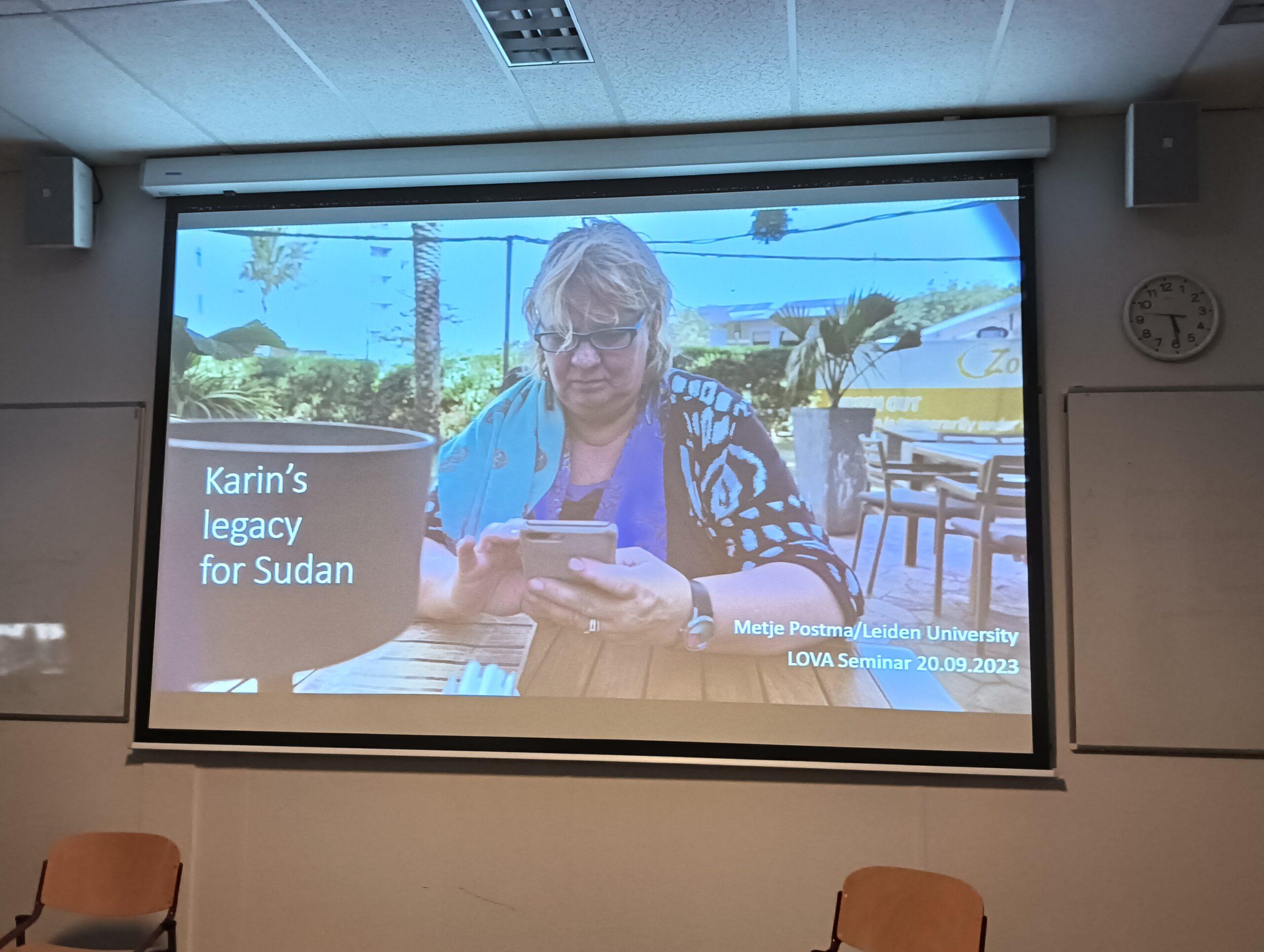On 20 September 2023 the annual Lova Study Day was organized at Leiden University as a seminar to commemorate Karin Willemse, Lova chair 1999-2004. Karin had passed away in March 2023 at the age of 61 because of illness she had coped with for quite some time. Lova members Tine Davids and Anke van der Kwaak had initiated and organised the seminar to honour Karin’s great contribution to feminist anthropology and gender studies, especially regarding her creative perspectives on theory and methodology in ethnographic research and writing. Since 1998, Karin worked at the History Department of the Erasmus School of History, Culture and Communication at Erasmus University Rotterdam (EUR), in recent years as assistant professor. An invitation for the event had been sent around by Lova Mail Service, as well as the programme.
Opening
Lova chair Jasmijn Rana opened the seminar, referring to the special place of Leiden University were Karin had been a student. In the 1970s the Centre for Women and Development (Vrouwen en Ontwikkeling, VENO) had been founded at the Anthropology Department of this university; in the 1980s it was renamed as Women and Autonomy Centre (Vrouwen en Autonomie, VENA). Recently Jasmijn found a bookshelf with VENO/VENA publications which can be checked later this day.
Anke van der Kwaak continued the opening part with first apologising Tine Davids for not attending the seminar because of a sudden illness. She also introduced the keynote speaker and mentioned some changes in the announced panel participants.
Keynote by Naomi van Stapele
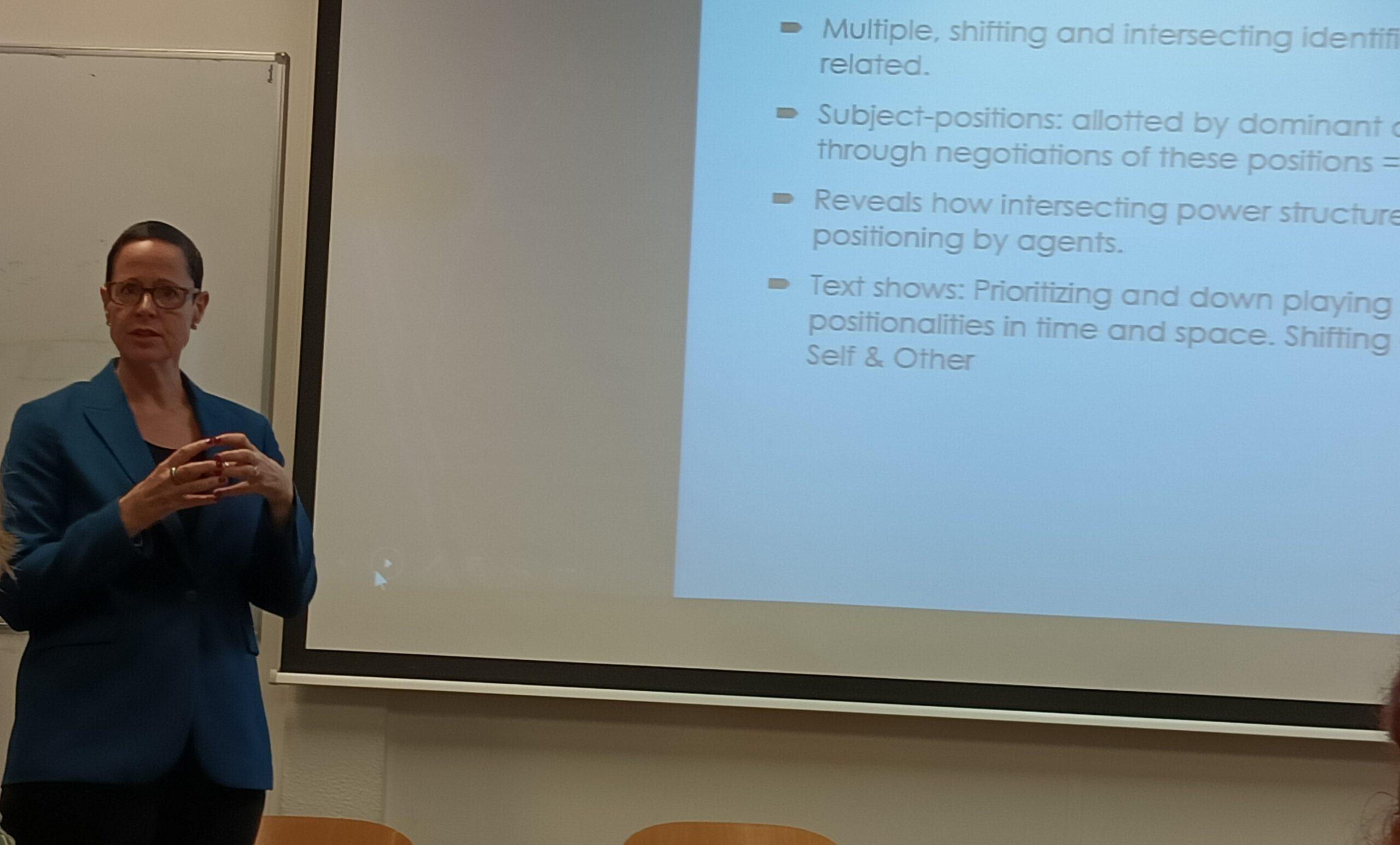
Naomi van Stapele took off with memorising that it was in September 2002 that she met Karin Willemse as one of her teachers in the bachelor’s programme in history at EUR. She remembers very well the magic of learning so many new ideas and terms like intersectionality, intertextuality, and intersubjectivity. Karin acted as supervisor for her bachelor’s and master’s theses at EUR and acted also as one of the supervisors of her PhD project at the Amsterdam Institute for Social Science Research (AISSR) of the University of Amsterdam. She was and still is very much impressed by Karin’s ideas about theory and methodology in ethnographic research and the presentation of data and feels honoured to be invited to share these today. These ideas are published in Karin’s book One Foot in Heaven: Narratives on Gender and Islam in Darfur, West-Sudan of 2007, which Naomi showed to the public. The book is based on the Karin’s PhD dissertation of 2001.
The methodology of ‘Con/text narrative analysis against the grain’ is central in Karin’s work. In this approach narrated texts in ethnographic research are deeply analysed, like peeling off layers of an onion. These texts can never be taken at face value: they bring together multiple bounded and meaning-making processes. Texts are not only the written down narrated stories of research participants, but also their oral, visual and bodily actions and reflections; all these texts should be subjected to analysis in relation to their contexts. Texts and contexts constitute each other and the meaning-making is continuous.
Three analytical lenses are central In Karin’s methodology: intersubjectivity, intersectionality and intertextuality. The first has to with the relation between research participant and researcher; the second with the subject-positions and identifications of both; the third is about the discursive level: what is said, how, where, when, to whom, and between whom. In a matrix these thee lenses are related with three topics: 1. research settings and relationships that produced the text; 2. knowledge of the plain and hidden political, historical etc. references that readers need to understand the text; 3. how does the narrator negotiate pertinent dominant discourses in the text. This matrix is meant to be used in ‘against the grain’ ethnographic research and writing.
After this explanation of Karin’s approach Naomi presented her analysis of a narration of one of her research participants in her own long-lasting research project in Mathare Valley, a low-income neighbourhood in the Kenyan capital of Nairobi.
Naomi concluded her keynote with presenting a range of very challenging questions and thoughts. These were, amongst others, about the term feminism; the problem of binaries; the concepts of authority and power; how ethnographers reach out to non-academic audiences; how to support oppressed people; dethroning dominant ontologies and epistemologies and foregrounding alternative ways of knowing, doing and becoming; problematizing the concepts of ‘I’ and ‘we’ in ethnographic writing; how to avoid making ‘open-ended writing’ the new essence. These questions provoked some interesting remarks from people in the audience directly after the lecture, who also applauded Naomi for her clear presentation. A revised text of Naomi’s talk was published in Lova Journal #44.
Panel with five speakers
After the break the panel session was opened by Alex van Stipriaan, a colleague of Karin at the History Department of the Erasmus School of History, Culture and Communication. Alex memorized the co-teaching with Karin of a master class for many years. They had a lot of discussions about the commonalities and differences in the phenomenon of water goddesses in his research area of Surinam and the wider Caribbean and in Karin’s research area of Sudan.
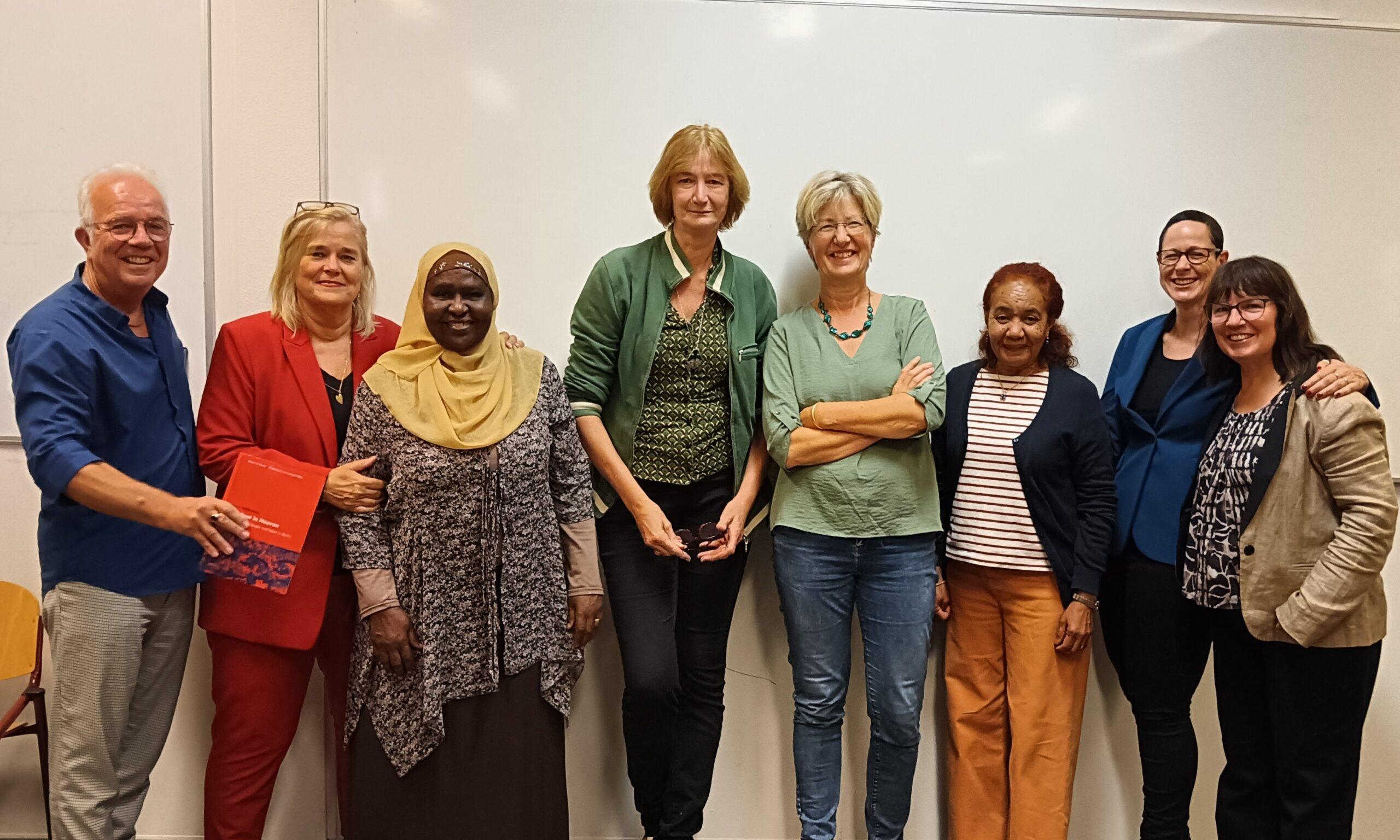
Speakers at Lova Study Day 2023: Alex van Stipriaan, Anke van der Kwaak, Mekka Abdelgabar, Metje Postma, Karin de Jonge, Tamador Ahmed Khalid, Naomi van Stapele, Marina de Regt.
Metje Postma, recently retired lecturer in the Visual Ethnography programme of the Institute of Cultural Anthropology and Development Sociology at Leiden University, continued the panel session with a talk about her collaboration with Karin in various projects. The ‘Taking back the street’ project of 2019 celebrated Sudanese culture and disseminated information about protests and demonstrations against the al-Bashir regime by way of a website with pictures and movies. Metje also reminded the fresh and challenging analyses Karin shared in her guest lectures for well known institutions like the British Museum and the Max van der Stoel Foundation.
The next panel participant Mekka Abdelgabar memorized her cooperation with Karin in the VOND (Vrouwen Organisatie Nederland-Darfur) foundation, the Darfur Women Organisation in the Netherlands which started in 2005. Mekka mentioned the importance of Karin’s support to their work; she even financed two trips of Mekka to Sudan to organise peace talks among various rivalling groups in the Darfur area. She also praised Karin as an excellent cook of Sudanese food which they enjoyed during meetings in Karin’s house and Karin’s knowledge of Darfur history and culture which was often more extensive than of most of their foundation activists from Sudan.
Karin de Jonge continued the panel session. As international cooperation consultant and leader of the NAP 1325 project at WO=MEN, the Dutch gender platform for international cooperation, she shared how she met Karin in the early 1990s in Darfur when they were the only female white western expatriates in the area. Since then they kept contact. During her last fieldwork period in Sudan Karin stayed in the house of the family of Karin de Jonge’s Sudanese husband in the northern town of Abri. Since April 2023, many refugees are stranded in this town because of the civil war initiated by the rivalry of two generals in the capital of Khartoum. A foundation was started to help some of these refugees, especially children and Karin de Jonge invites the audience for financial donations, which would be very much in line with Karin’s legacy as she helped and supported so many people in Sudan.
The last speaker of the panel was Tamador Ahmed Khalid from Khartoum. In the 1980s she studied in the Netherlands and helped Karin to learn Arabic. They became friends and when Karin went to Sudan for her PhD research and later projects she stayed in her house, which was the case various times. When Tamador is in the Netherlands for her work she was always welcome to sleep in Karin’s house in Leiden. Tamador talked about the close friendship she had with Karin and the lively and sometimes heated talks and discussions they had about child marriage, sexuality, slavery, colonialism, the life in Darfur and in the northern town of Abri, as well as more personal issues. She thanks Karin for her deep knowledge of and respect for Sudanese people.
In the last part of the Lova Study Day 2023 the award ceremony of the Lova Marjan Rens Master’s Thesis Award 2023 took place, of which a report is available. And then it was time for many more informal talks during the drinks.
Get an impression in the gallery of pictures.
